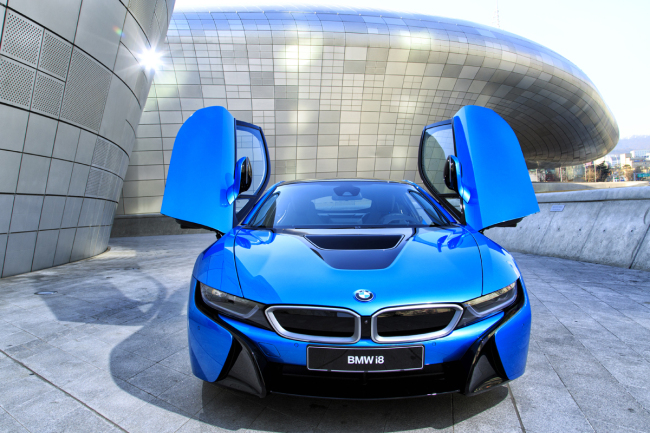The BMW i8, plug-in hybrid electric vehicle by the German luxury carmaker, finally arrived in Korea on Thursday amid high expectations among drivers and market analysts.
Flaunting fuel economy of a maximum of 47.6 kilometer per liter, the “fuel monster” is expected to lead the hybrid car competition that is fast heating up.
 |
BMW i8. (BMW Korea) |
“The i8 model epitomizes BMW’s vision for sustainable mobility solution,” a BMW PR representative said. “From the aerodynamically groundbreaking body design and visionary interior design to the life module passenger cell made from carbon-fiber-reinforced plastic, drive system technology, high-voltage battery, chassis as well as crash and structural functions integrated into the aluminum Drive module, the car is equipped with everything that BMW has to offer for the future,” he added.
At a glance, the design of the car is very impressive.
The “scissor doors” open upward like wings. And the 4.6 meter-car has classical sports car proportions, full LED headlights, stretched roofline, short overhangs and long, 2,800-millimeter wheelbase.
But the main highlight is the engine.
The car’s plug-in hybrid drive system, which comprises a BMW TwinPower Turbo engine combined with BMW eDrive technology, offers potential for improved efficiency and exciting, sporty driving characteristics, the carmaker said. BMW has developed the internal combustion engine, electric motor as well as its power electronics and battery.
The three-cylinder combustion engine boasts 170 kW/231 horsepower and drives the rear wheels, while the 96 kW/131 horsepower electric motor draws its energy from a lithium-ion battery, which can be charged with 220V-plug, as well as BMW i-Wallbox and public chargers.
This bespoke plug-in hybrid system enables a speed of up to 35 kilometers under normal conditions and a top speed of 120 kph on electric power alone. With both engines, the driving range spans to 600 kilometers after a full-charge. It takes 4.4 seconds for the car to reach 100 kph speed from zero.
The talk-of-the-town fuel mileage reaches 47.6 km per liter for plug-in hybrid mode and 13.9 km per liter for hybrid. The carbon emission is also significantly low, with 123 grams per kilometer for hybrid and 49 g/km for plug-in hybrid.
One can choose four different driving modes ― Sport, Comfort, ECO PRO and eDrive. A Connected Drive program providing emergency calls and other facilities will be offered, alongside driving assistance, electronic parking brake, alarm for the pedestrians and others. The BMW i-Remote App for smartphone users will help drivers check on the battery charging as well as fuel status in real time.
The BMW i8 is expected to open up the PHEV competition, with Hyundai’s Sonata PHEV slated for June to be followed by Audi’s A3 Sportback e-tron. Since the government is planning a 1 million won-subsidy for hybrid car buyers on top of the acquisition and registration tax exemption, the market is expected to grow, onlookers say.
Still, BMW seems to be ahead in the race. In order to the pave way for the all-electric i3 vehicle and i8, BMW has joined hands with POSCO ICT to establish a total of 200 charging systems across the nation. This year, the company is planning to add 200 more to better the users’ convenience.
BMW aims to sell a total of 185 units this year, with 100 having been sold in advance. The BMW i8 comes in five colors ― Iconic Silver, Protonic Blue, Crystal White and Sophisto Grey with two different highlights. It is priced at 199 million won ($181,000).
By Bae Ji-sook (
baejisook@heraldcorp.com)






![[Herald Interview] 'Trump will use tariffs as first line of defense for American manufacturing'](http://res.heraldm.com/phpwas/restmb_idxmake.php?idx=644&simg=/content/image/2024/11/26/20241126050017_0.jpg)
![[Exclusive] Hyundai Mobis eyes closer ties with BYD](http://res.heraldm.com/phpwas/restmb_idxmake.php?idx=644&simg=/content/image/2024/11/25/20241125050044_0.jpg)
